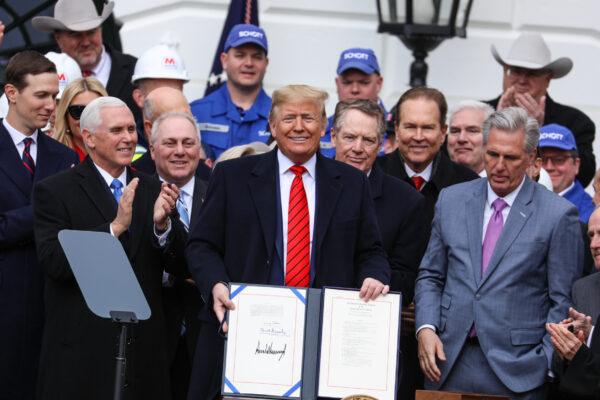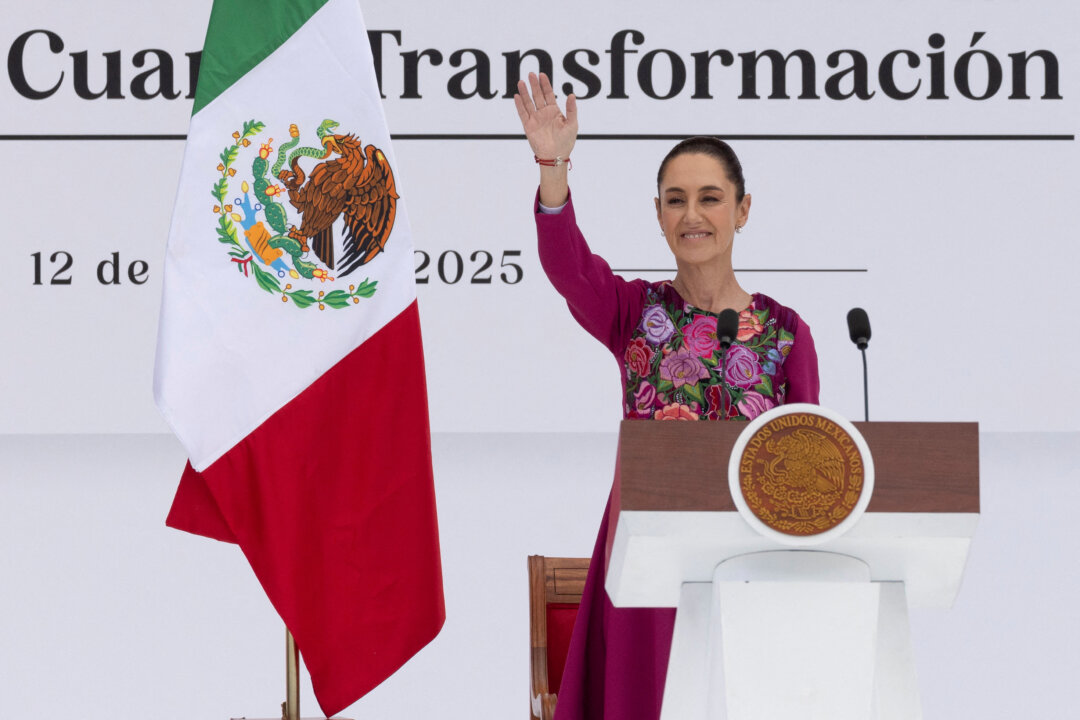Claudia Sheinbaum also defended the U.S.-Mexico-Canada trade pact—due for review in 2026—saying it was the only way to compete against China.
Mexico’s President Claudia Sheinbaum unveiled a new economic strategy on Monday which includes plans to reduce imports from China, as Mexico comes under pressure from the United States and Canada.
Plan Mexico aims to reduce the Mexican textile and auto industries’ dependence on Chinese imports, and help Mexican steel producers, who have accused China of undercutting their prices in the market.
Sheinbaum also defended the U.S.-Mexico-Canada (USMCA) trade pact, which is up for review in 2026.
She said, “It has proven to be one of the best trade agreements in history, and it is the only way we can compete with Asian countries, particularly China.”
Tensions with the United States—Mexico’s biggest trade partner—have been heightened in recent months with President-elect Donald Trump threatening to impose tariffs of up to 25 percent and accusing China of using Mexico as a back door to the United States.
Last week the Premier of the Canadian province of Ontario, Doug Ford, told Fox News: “China is the problem. China is shipping cheap parts into Mexico, and then Mexico, slapping a ‘Made-in-Mexico’ sticker on them and shipping them up through the U.S. and Canada, costing American and Canadian jobs. Mexico has to make a choice: either with Beijing or Washington.”
Mexico has recently rolled out tariffs targeting e-commerce giants Shein and Temu.
Sheinbaum—who was elected in June, and replaces Andrés Manuel López Obrador, from the same Morena party—did not directly address the criticisms of Trump or Ford in her speech.But she said, “Our objective is to expand to the entire American continent, which is the vision we want to have in order to be the region with the greatest potential and development in the world.”
Sheinbaum said she was making economic growth a top priority and said the policies she was setting out would increase investment and make Mexico one of the world’s top 10 economies by 2030.
Mexico is currently the world’s 12th biggest economy, behind Russia and Canada.
Sheinbaum said she planned to cut bureaucracy and create a business-friendly environment, and aimed to get investment to 28 percent of GDP, adding 1.5 million manufacturing jobs.
Her predecessor and mentor, López Obrador, often clashed with private industry but her economy minister, Marcelo Ebrard, said growing the economy was a, “collective job,” and he thanked the private sector for building what he described as a, “navigational chart for the new era we are entering.”
The Mexican government promised to strengthen customs enforcement, a key demand of the incoming Trump administration.
Sheinbaum, who was a climate scientist before turning to politics, said she would continue to honor environmental pledges and set a target for Mexico’s energy grid to run on 45 percent sustainable energy by 2030.
López Obrador pumped billions of dollars into the state-owned oil company Pemex, which is heavily in debt and has been accused of pollution.
Trump, who will return to the White House on Monday, reiterated on Jan. 7 his intention to impose tariffs on Mexico and Canada, citing concerns about illegal border crossings and the smuggling of illicit drugs and firearms into the United States from both borders.

Sheinbaum has been seeking to pacify Trump’s concerns and in November Trump said she had agreed to prevent illegal immigrants crossing into the United States.
Trump wrote in a post on TruthSocial, “She has agreed to stop Migration through Mexico, and into the United States, effectively closing our Southern Border.”
The USMCA trade agreement was introduced in 2020 after Trump tore up the 26-year-old North American Free Trade Agreement—negotiated by President Bill Clinton’s administration—which he described as the “NAFTA nightmare.”
Reuters contributed to this report.

